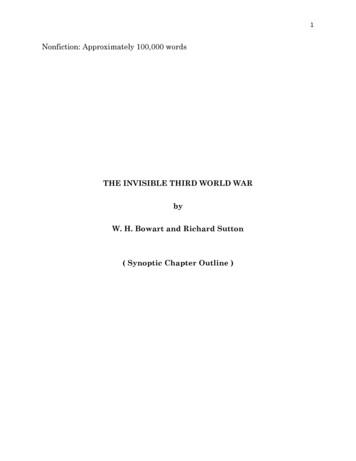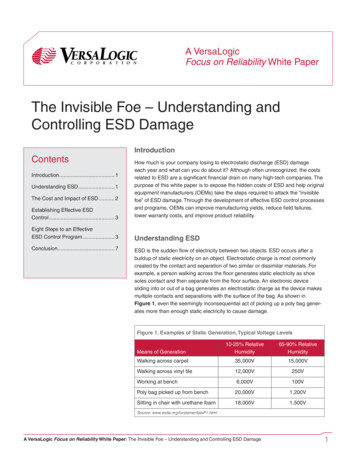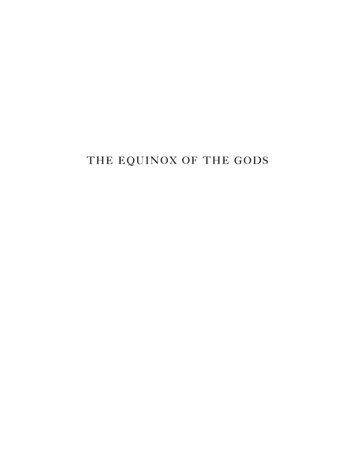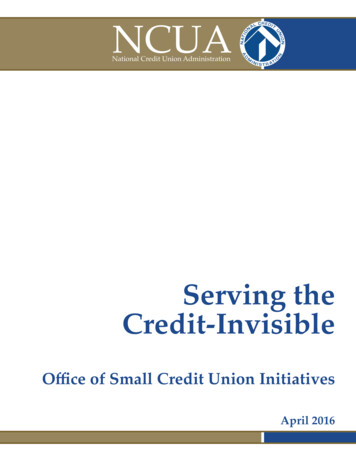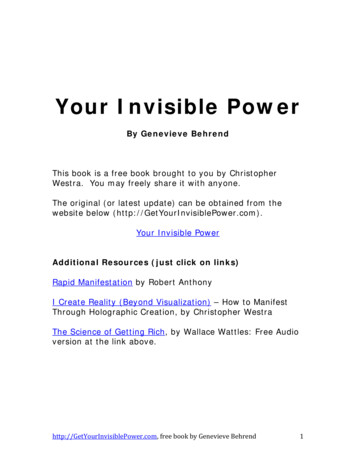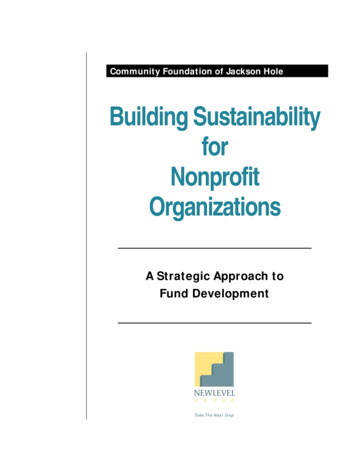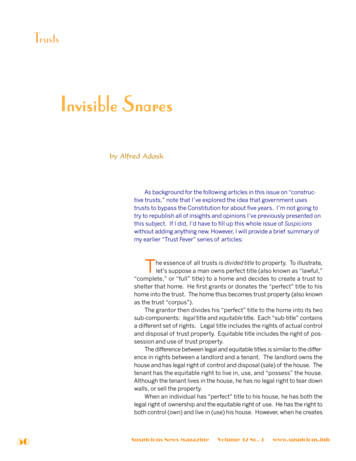
Transcription
TrustsInvisible Snaresby Alfred AdaskAs background for the following articles in this issue on constructive trusts, note that I ve explored the idea that government usestrusts to bypass the Constitution for about five years. I m not going totry to republish all of insights and opinions I ve previously presented onthis subject. If I did, I d have to fill up this whole issue of Suspicionswithout adding anything new. However, I will provide a brief summary ofmy earlier Trust Fever series of articles:The essence of all trusts is divided title to property. To illustrate,let s suppose a man owns perfect title (also known as lawful, complete, or full title) to a home and decides to create a trust toshelter that home. He first grants or donates the perfect title to hishome into the trust. The home thus becomes trust property (also knownas the trust corpus ).The grantor then divides his perfect title to the home into its twosub-components: legal title and equitable title. Each sub-title containsa different set of rights. Legal title includes the rights of actual controland disposal of trust property. Equitable title includes the right of possession and use of trust property.The difference between legal and equitable titles is similar to the difference in rights between a landlord and a tenant. The landlord owns thehouse and has legal right of control and disposal (sale) of the house. Thetenant has the equitable right to live in, use, and possess the house.Although the tenant lives in the house, he has no legal right to tear downwalls, or sell the property.When an individual has perfect title to his house, he has both thelegal right of ownership and the equitable right of use. He has the right toboth control (own) and live in (use) his house. However, when he creates50Suspicions News MagazineVolume 12 No. 1www.suspicions.info
a trust, he appoints one or more trustees to hold the legal title to hishome, and he appoints one or more beneficiaries to actually live on theproperty. The trustees effectively manage the home; the beneficiaries getto live in the home.It s a hard and fast rule that the trustees can t enjoy the benefits ofthe trust property, nor can beneficiaries exercise any real control (ownership) over trust property. Whenever a single individual holds both thelegal title and equitable title to a trust property, the sub-titles are onceagain unified into a single perfect title, the trust is said to be executed and ceases to exist.Trusts offer a number of advantages. First, trusts can provide forbeneficiaries who are too incompetent to provide for themselves.For example, a wealthy father can create a trust that includes money orproperty that s to be used exclusively for the benefit of his minor children.As beneficiaries, his children will get to use the father s property (a house,perhaps) or receive the profits from a business or investment but theydon t own legal title to the house or business and thus can t foolishly sellthat property. The right of sale and actual control of the trust property isleft to the trustees. The advantage of this system is that if the father dieswhen the children are young and foolish, he needn t worry about his kidsselling the house for 1,000 to buy a new electric guitar or some drugs.A second, and perhaps more important advantage of trusts, is thatthey provide limited legal liability for trust property and/or trust members.For example, suppose the kids who are beneficiaries of the mansionleft by their wealthy father, get drunk, and cause an automobile accident inwhich several people are killed or injured. The survivors and heirs of thevictims may see the kids multi-million-dollar home and sue to gain ownership of that property. But if the mansion is held in trust, their lawsuit willbe unsuccessful. As beneficiaries, the kids get to use the mansion, butthey don t own it. As a result, you can no more sue the beneficiaries forthe property they use, than you can sue the owner of an apartment complex when one of his tenants causes an automobile accident on the street.Shielded by a network of trusts, it s entirely possible to live like a kingand never have personal assets of more that 500 to your name. Sure,people can still sue you. They can even win massive judgments againstyou. But insofar as you lack legal title to property, you own nothing, andtherefore there s nothing that can be taken from you. As a result, you canbe virtually litigation proof. Essentially, no one will waste money payinglawyers to sue a beneficiary who has no more personal assets than a homeless bum.A few years ago, a former governor of a south-western state retiredfrom public office into a life of wealth and leisure. He promoted and personally guaranteed an investment scheme which failed. Based on his personal guarantee and presumed personal wealth, he was ultimately suedby his investors for the millions of dollars they d lost. On receipt of thesuit, the former governor s lawyers replied that everything their client hadwas in trust, his personal net worth was trivial, and they would thereforenot even bother to defend against the investors suit.Suspicions News MagazineVolume 12 No. 1www.antishyster.com51
Even though the former governor lived like a king in a mansion, hisassets were all held in trust, he was a legal pauper and therefore beyondthe reach of lawsuit. If the investors wanted to waste even more of theirmoney paying their lawyers to sue the former governor, they were free todo so, but they d never collect a dime. Result? The former governor stayedin his mansion and the investors suit was dropped. You can t squeezeblood out of a turnip or a legitimate trust.A third advantage is that trusts can be extremely secretive. The manw aryewhoplaces his mansion in trust for the benefit of his children has no obligaN ionttion to inform the state or his neighbors ofguginvolthe creation of that trust. Your trust mightRe nti-A la!A rmuonly become public knowledge if it were enThis is the Stuff of Genius!Fotangled in a lawsuit.Doctors and Scientists are Calling itAlthough there are statutory trusts “The Greatest Breakthroughwhich are sanctioned by the state and crein Nutritional Science in Decades”ated according to state-approved rules,This discovery solves the mystery of whythere is no requirement that trusts be statuwe age so quickly!tory . You can create a private trust rightnow, in privacy of your own home, withoutDear Friend and Seeker of Greater Health,informing anyone except the trustee you apAn amazing new health formula is changpoint to manage the trust. Unlike corporaing the lives of thousands around the country. Thistions, which must be registered with theis extraordinary! It’s backed by millions of dollarsstate, trusts can be established without pubin scientific research, and endorsed by hundredslic or governmental knowledge or approval.of doctors. Many of the testimonials around thisproduct are astonishing. This formula can significantly boost the immune system, increase energyand rejuvenate the human body. It works great forages 5 to 95. It is available through only onecompany. There is no other formula like it anywhere not in health food stores not in networkmarketing nowhere else!For more details and an intriguing andhighly educational FREE audio tape, cail ourTOLL FREE 24 hour recorded message at1-888-271-1448stFind out more about this 21 CenturyNutritional Wonder!Call Toll Free Recorded Message1-888-271-1448Are you tired, low on energy, sick or in pain?The improvements in health range fromgood to great to mind boggling. Order yourFREE audio tape today!lthr Hea gh!ojaMukthroaerB52Suspicions News MagazineDespite their several advantages much like the Force in the StarWars movies trusts also have a dark side .For example, if government creates a trust(like Social Security) and tempts you to accept its benefits, it can thereafter treatyou as a beneficiary of a that trust. Whilebeing a beneficiary may have certain advantages (limited liability, secrecy) in privaterelationships, being a beneficiary of a governmental trust can create serious politicaland legal disabilities: beneficiaries implicitly surrender any claim to legal and/or unalienable Rights with respect to trust property.The problem with beneficiaries is thatthey have no legal rights within the contextof the trust. The reason for this disability isthat according to Bouvier s Law Dictionary(1856) all rights flow from title. For example, the reason you can drive your car,but you can t drive mine is that you have atitle to your car but you have no title to mine.Your right to live in your home or apartmentVolume 12 No. 1www.suspicions.info
ultimately flows from a title to that property. Even if you don t personallyhold a title to that house or apartment, you are ultimately renting fromsomeone who does.But it s not only true that your rights to property flow from your title toa property; it s true that the kind of rights your receive depend on the kindof title you hold. Virtually everyone assumes that there is only one kind oftitle: the perfect or complete title that a grantor must possess tocreate a trust.That assumption is wrong. Remember how the essential feature of atrust is division of perfect title into it s two sub-titles legal and equitable? With legal title, trustees receive one bundle of rights (ownership,control, disposal). With equitable title, beneficiaries receive a differentbundle of rights (possession and use). These bundles are mutually exclusive. By definition, being a trustee means you can have no equitable rightsin trust property. Likewise, beneficiaries, by definition, have no legal rightsto trust property.This distinction between kinds of title becomes particularly important when a beneficiary goes to court as a plaintiff. Although the plaintiffbeneficiary may suppose his case will be heard in a court of law, he ll bewrong. The only purpose for a court of law is to determine legal rights. Itfollows that if you don t have legal title to the subject matter of a lawsuit,you can t have legal rights to that subject matter, and therefore, you haveno standing at law. Unless you have legal title to the subject matter of acase, there is nothing for a court of law to decide.As a result, beneficiaries can t invoke a court of law (which only decides legal rights) when they litigate. Instead, beneficiaries but must always invoke a court of equity wherein the judge rules strictly according tohis own alleged conscience . In equity, the judge is unbound by law andthe litigants are virtually helpless to resist almost any decision the judgewishes to impose. If the judge doesn t like the color of your eyes, yourpolitical bias or your religious beliefs, he can rule against you. Beneficiaries have virtually no rights or recourse to defend themselves against judicial bias or even overt oppression. Beneficiaries are always at the mercyof the court.Thus, from government s point of view, degrading a Citizen to the statusof beneficiary essentially empowers government to treat the beneficiary as asubject. As subjects, we are obligated to accept without question or constitutional defense virtually any regulation the government wishes to impose.In other instances, government also tricks us into accepting the roleof trustee relative to governmental or private trusts. If we unwittinglyaccept that status of trustee, government can impose a virtually unlimited list of fiduciary duties (like paying income tax) upon us. In thecapacity of trustee, we must accept whatever burdens and obligationsare placed upon us by the trust indenture (rules of the trust) even ifthose duties are seemingly unconstitutional.Although you can t be both trustee and beneficiary of the same trust,you can simultaneously be a trustee of one trust and a beneficiary ofanother. As a result, government will sometimes treat us as beneficiaries;sometimes as trustees. In either case, our claim on unalienable Rights isSuspicions News MagazineVolume 12 No. 1www.antishyster.com53
compromised or implicitly denied. This denial is particularly frustrating,mysterious, and seemingly inexplicable because not one man in 10,000could even imagine that the government might surreptitiously impose thesetrust relationships and legal personalities on us without our express knowledge. But through these unexpected trust relationships, the governmentand courts can secretly bypass the Constitution and deprive us of ourunalienable Rights based on the presumption that we understood andvoluntarily agreed to surrender those Rights when we became beneficiaries.At first, the idea that government could use trusts to bypass the Constitution and deprive us of rights or subject us to unexpected duties soundsabsurd. But trusts have several major attributes that make this kind ofcovert oppression possible.First, anyone including government can create a trust withoutexpressly using the words trust, trustee, grant, grantor, benefit, beneficiary or any otherterm that is normally associatedSay goodbye to your monthly phone bill.with trusts. Regardless of wordsFlat-rate Unlimited calling plans have arrived.used (and even when no words areNever Be Charged by the Minute Again.used), it is incumbent on every perUnlimited—Make both In-state and Out-of-state calls.son to recognize their role in a trustResidence or Small Business 59.95 per monthby recognizing the nature of theirMore info, click Future Phonerelationship to another person ortrust property.I doubt that one person in one hundred can even understand what Ijust wrote. Worse, I doubt that one person in 10,000 can recognize a trust relationship whenever he happens to participate in one.For example, suppose you borrow my pen. Insofar as I expect you toreturn my pen, we have just entered into an unstated trust relationshipwherein I am the beneficiary (the one who trusts you will return my pen)and you are the trustee (the one who temporarily controls the pen). Eventhough neither of us used the words trust, benefit etc. even thoughyou did not expressly agree to return my pen, I am trusting that you willreturn my pen, you are trusted with control of my pen, and therefore, wehave a simple (unexpressed) trust relationship.Creating trust relationships can be just that simple. As a result, it seasy for government to entangle folks in trust relationships (and therebycompromise whatever rights they might normally expect to have) withoutfolks having any idea of what s happening.Further, few people realize that whenever the word Application isused by an governmental agency, it typically means Application for Benefits . For example, when you fill out an Application for a drivers license,Social Security Card, or bank account, you are probably applying for a benefit to be provided by a governmental trust. You can t normally receive a benefit without being a beneficiary and beneficiaries haveno legal rights. Thus, by voluntarily filling out an application you mayunwittingly forfeit your claim to any legal rights or standing at law relativeto the trust property.54Suspicions News MagazineVolume 12 No. 1www.suspicions.info
If you d like to see an express trust agreement, read a softwarelicense from Microsoft or any other major software provider. The license identifies you as the End-user . Anytime you see the word use or user beware of the possible presence of a trust relationship. In thecase of software, Microsoft makes it clear that you don t own the softwareproduct you merely get to use it on one computer. But at all times realownership of the product remains with Microsoft; they own legal title tothe software. Your license merely gives you an equitable title (or interest) to use their software.If you don t like your limited rights as a beneficiary, your only option isto return the software (trust property). Otherwise, by continuing to use the software (accepting the benefit) you have virtually no legal rights againstMicrosoft. If the software crashesyour computer, destroys the database that runs yours business, or95 for 15,000 impressions 1 issue ( 6 CPM)causes you accounting software toadd a zero to the amount of money150 for 30,000 impressions 2 issues ( 5 CPM)your computer sends by check toCurrent ad sizes & prices ateach of your creditors tough. Ashttp://www.suspicions.info/ad prices.htma beneficiary you have almost noSend ad and check to: Suspicions POB 540786 Dallas,recourse at law against the grantor,Texas 75354-0786 The United States of Americatrust or trustee.or email to: adask@suspicions.infoThus, even without any expressindication that your application MC, Visa, & Amex call: 972-418-8993can bind you to a trust relationship,a trust relationship and resulting diminished status can be impressed onyour life. When you filled out the application, you probably thought you dreceive some free benefits . Silly you. What you didn t know (and theyhad no obligation to disclose) was that you d pay for that beneficial pottage with the surrender of your unalienable Rights. If you should everlodge a complaint against the trust or trustees, the courts will silentlypresume that: 1) you recognized the trust relationship when you applied to become a beneficiary, and 2) you knowingly and voluntarily surrenderedyour unalienable and legal rights when you applied to become beneficiary.Based on those silent presumptions, you will lose your case. Insofaras the average person can t even imagine that they could be seduced intosurrendering their unalienable Rights by filling out a mere Application, they will never raise an effective defense in court against the imposition ofduties (or loss of rights) under an unseen governmental trust.Do you see the potential power? Even though trusts are virtuallyinvisible to 98% of Americans; even though we have no training in trustsduring our grade school, high school or college education we are expectedto see trust relationships whenever we encounter them. If we fail to seethose trust relationships, we will still be bound by their invisible chains.But if you can t see those invisible chains, how can you complainabout them to the court? If you don t expressly complain about thosechains, the court will leave them in place (around your neck). Thus, throughtrusts, you can be effectively enslaved without even knowing how thatenslavement occurred.Your Ad Here! Suspicions News MagazineVolume 12 No. 1www.antishyster.com55
Second, unlike contractual relationships, there s no requirementfor full disclosure when you create a trust and designate someone to be a beneficiary. The best illustration of this attribute is the factthat I can create a trust and designate my six-year old daughter as beneficiary. There is no requirement that I fully disclose the terms of the trustto my beneficiary.Why? Because, as a beneficiary, she is presumed incompetent andunable to understand the operation of a trust. Similar presumptions allowgovernment to impose trusts on adult beneficiaries who are also deemed incompetent to understand the relevant trust privileges and duties. Thereis no more need to fully disclose trust rules and regulations to adult beneficiaries than there is to fully disclose trust rules and regulations to children.Similarly, government can create a trust and designate you as a beneficiary of that trust without expressly informing you of that fact. As aresult, whenever you relate to property of that governmental trust, youwill have no legal rights and will be treated as a mere beneficiary in a courtof equity.Insofar as we are presumed to have accepted appointment as trustees, we can also be bound by rules which have never been expresslyexplained to us and even by arbitrary rules that, ordinarily, would be exceed the constitutional limits of government s delegated powers. For example, under the Constitution, government has no authority to penalize aman who has not damaged another person s body or property. However,if that person enters into a trust relationship with government, government can absolutely regulate and even punish that man s acts wheneverthey violate arbitrary trust rules even if no other person or person s property has been damaged.In sum, trusts can be created and imposed without express words,without full (or any) disclosure, and without our express knowledge (insecret). As a result, trusts can be used as invisible snares to trap all ofus into relationships and roles which compromise our rights as Citizens,reduce us to the status of subjects, and impose unwanted duties. Andinsofar as we are totally unaware of trusts and their strange powers, theyare virtually invisible to us, and thus virtually impossible for the vast majority of Americans to resist or escape.56Suspicions News MagazineVolume 12 No. 1www.suspicions.info
Constructive trustsAt Arm’s Lengthby Alfred AdaskIs there a device able to ward off unseen and unwanted trusts? Amagic amulet to wear around our necks to keep us safe from the boogytrust ?Probably not. If there is a way to effectively ward off disabling trusts,it will probably depend on having sufficient personal knowledge of truststo recognize, avoid or at least expressly protest each relationship with agovernmental trust as they re encountered.Even so, there is a term defined in several editions of Black s LawDictionary which seems to ward off constructive trusts much like garlicwards off vampires: at arm s length . The term is defined in Black s 1stEdition (1891) and 4th Edition (1968) as: Beyond the reach of personal influence or control. Partiesare said to deal at arm s length when each stands upon the strictletter of his rights, and conducts the business in a formal manner,without trusting to the other s fairness or integrity, and without being subject to the other s control or overmastering influence. [Emph. add.]The classic definition of beneficiary is one who trusts . Therefore, ifone acts only at arm s length, he would seem to do so without trusting and, thus, couldn t be a beneficiary.1Black s 7th Edition (1999) does not define the term at arm s length .Instead, it defines arm s-length as an adjective that means: Of or relating to dealings between two parties who are notrelated or not on close terms and who are presumed to have roughlyequal bargaining power; not involving a confidential relationship an arm s-length transaction does not create fiduciary duties between the parties . [Emph. add.]Suspicions News MagazineVolume 12 No. 1www.antishyster.com57
The concepts of confidential relationship and fiduciary duties arenormally essential to trust relationships. Because these concepts are denied by the definitions of at arm s length (Black s 1st and 4th), and arm s-length (Black s 7th), both terms seem to implicitly deny the existence trust relationships.2Black s 7th defines fiduciary relationships as:A relationship in which one person is under a duty to act forthe benefit of the other on matters within the scope of the relationship. Fiduciary relationships such as trustee-beneficiary,guardian-ward, agent-principal, and attorney-client require thehighest duty of care. Fiduciary relationships usu. arise in one offour situations: (1) when one person places trust in the faithfulintegrity of another, who as a result gains superiority or influenceover the first, (2) when one person assumes control and responsibility over another, (3) when one person has a duty to act for orgive advice to another on matters falling within the scope of therelationship, or (4) when there is a specific relationship that hastraditionally been recognized as involving fiduciary duties, as witha lawyer and client or a stockbroker and a customer. Also termfiduciary relation; confidential relationship. [emph. add.]There s a lot to be derived from that definition, but I want to explorejust two elements:First, fiduciary relationships are not confined to the beneficiarytrustee relationships of trusts. Instead, fiduciary relationships also include guardian-ward, agent-principal, attorney-client and possibly otherunnamed relationships. (Could these un-named fiducial relationship includehusband-wife, parent-child, employer-employee, business-customer, doctor-patient and teacherstudent?)This multitude fiduciary relationships seem governed by principleslargely indistinguishable from thosegoverning trusts. I strongly suspectthat most of these relationships although they carry alternative designations may be varieties oftrusts.Second, Black s definition of fiduciary relationships uses the words relation and relationship eighttimes. That emphasis on relationships may seem unremarkable, but asyou ll read in the article Legal Personality (this issue), relationships may be far more important than most of us have so far imagined.For example, I m beginning to wonder if our invisible, external relationships may have a legal existence of their own that s separate andapart from our individual existence. We know that the names Alfred Adask Outlaws Legal ServiceAll Rights PreservedAll Wrongs RevengedUnconventional Lawwww.outlawslegal.com58Suspicions News MagazineVolume 12 No. 1www.suspicions.info
and ALFRED N. ADASK signify two different legal entities. Alfred is anatural man and creation of God; ALFRED is an artificial entity presumably created by government. But what kind of artificial entity is ALFRED ?Is it a trust? A corporation? Bothanswers have been advanced; sofar, neither has proven satisfactory.Is it possible that all upper-caseHow to create a [leveraged] income ofnames like ALFRED identify a relationship rather than a unique andisolated artificial entity? In otherwords, if Alfred Adask identifiesa natural man who exists as aNOT MLM ! NO HYPE ! People see it or they don't. It's that simple.unique, independent individual withl 750 puts you in the mix . . . then sponsor ONLY (2) to qualify!out reference, relationship or dependence on any other person orl Only ONE way people can join our program: Go through a process.gover nment is ALFRED N.l Most people go through a painful process everyday called aADASK an artificial person (leJ-O-B for peanuts. What process would you go through forgal personality?) that exists only inthousands? Call (618) 355-1156 ( 24 Hours )relation to others?This program is NOT for everyone, but it is for anyone.Does the artificial entity ALFRED exist only in the imaginaryMore info send an email to: cashnow3@quicktell.net space between two persons ( Alfred and Wendy ) who had whator CALL this number RIGHT NOW!was construed to be a fiduciary re1-800-881-1540 Ext- 6060lationship . If so, the identify of ALRemember, there are only so many tomorrows.FRED might be diagrammed someWhatever you need to do, do it today.thing like this:LIFE in the CASH LANE ! 4- 12 "grand" a month—in 2-6weeks—tops!Alfred ----------- ALFRED ------------- Wendy(natural man) (artificial entity) (natural woman)This notion is more complex than the diagram suggests, but as you llread in a later article ( Legal Personalities ), the idea might not be as halfbaked as it first seems. If ALFRED is a legal personality that exists onlyin the space between two persons having a fiduciary relationship, itwould imply that ALFRED can t exist if the fiduciary relationship between Alfred and Wendy were denied. In other words, if Alfred andWendy entered into their mutual transactions at arms length, there d beno relationship between them, and ALFRED might not exist. Given thatvirtually all of our lawsuits are denominated in ALFRED s name, the nonexistence of that entity might cause the courts some inconvenience.I m even starting to wonder if a relationship might not be the primary subject-matter of most lawsuits in equity.Is it possible that the plaintiff isn t the subject matter, the defendantisn t the subject matter; what one or the other party did or didn t do isn treally the subject matter. Is it possible that, at bottom, the real subjectmatter of most suits in equity is a presumed trust relationship betweenthe plaintiff and the defendant?Suspicions News MagazineVolume 12 No. 1www.antishyster.com59
This may be an important avenue of investigation since subject matter jurisdiction is so critical to court jurisdiction that it can be challengedat any time even long after a case has been decided. So, if a court s subject matter jurisdiction were based on an unstated but presumedtrust relationship between the plaintiff and defendant, and if the defendant were able to expressly denythe existence of that presumed trustrelationship, then it might be arguedMake up to 200.00 per hour inthat the court lacked subject mattera very simple business wherejurisdiction and it s verdict wasyou could earn 100% return oftherefore void.your investment in as little asThe idea that presumed (con4 months! Learn the TRUTHstrued) trust relationships may proabout who REALLY IS gettingvide the subject matter jurisdictionrich with vending and amusefor many of our court cases is alongshot. It s probably wrong. Butment machines! How, what,if it were true, the implications wouldand why. Read Bill Way’sbe enormous: virtually every casebest-selling book,decided in a court of equity mightbe challenged (even years after thedecision) for lack of subject matterjurisdiction. That possibility, no matFREEdetailsonline:ter how remote, makes me giggle.inhicGrow R n e s s !naC(Actually, it makes me laugh. . . .eiwww.LiveFree.comBusnyonHow A ’s B e s t C a s hNo, no it makes me roar with laughcayAmeriToll free:Bill Water.)Remember, as pointed out in the888-383-6902 or 970-221-9000previous articles on trusts in thisGrow Rich In America’sBest CASH Business!ESSCCUSGVENDINSTERCSE“Vending SuccessSecrets.”issue, trust relationships can be construed (created out of thin air) bythe courts to achieve jurisdiction over unsusp
about who REALLY IS getting rich with vending and amuse ment machines! How, what, and why. Read Bill Way’s best-selling book, “Vending Success Secrets.” FREE details online: www.LiveFree.com Toll free: s Best Cash Business! How Anyone Can Grow Rich in Bill Way Grow Rich In A
